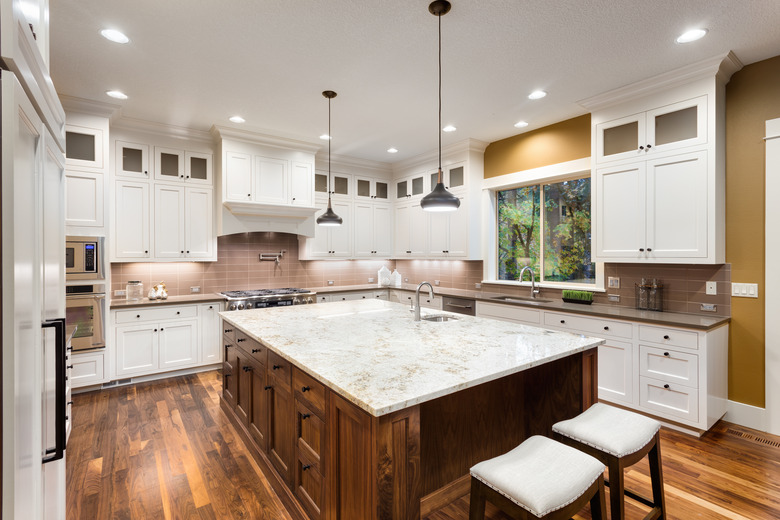What Are The Causes Of Cracks In Granite Countertops?
We may receive a commission on purchases made from links.
Granite is a highly durable product, which makes it an ideal material for kitchen countertops. To artfully repair a cracked granite countertop or other natural stone surface, you'll need a good understanding of what is causing the fissure, the nature of the material and the best tools and techniques to use to fix the issue.
Tip
Causes of cracks in granite countertops can be from natural occurrences or excessive weight or heat.
Causes of Cracks in Granite
Causes of Cracks in Granite
Cracks in natural stone are somewhat common, to a degree. Natural fissures within the granite can actually weaken the countertop, according to Synmar. When a lot of weight is placed on the counter over a long period of time, the cracks within the countertop can run to the surface and create a crack.
Excessive heat, such as when a hot pan is placed on the surface without a pad or trivet, can also cause cracks to form on the surface of the granite countertop. If cabinets are not secured and level with each other, then cracks can pop up on the natural stone surface. Don't use the countertop as a stepping stool or ladder for painting, changing light bulbs or cleaning purposes. The uneven distribution of weight can stress the granite.
Distinguishing Between Cracks and Fissures
Distinguishing Between Cracks and Fissures
There is a difference between a crack in the granite and a fissure. Knowing the difference can help you to understand how to repair the issue or if it needs repairing by a professional.
A crack can run deep into the stone and is generally in one area, typically due to some recent high stress. According to Marble, areas around sinks and cooktops, which have been cut and tend to be thinner than other surface areas of the granite countertop, tend to get cracks. Fissures can happen naturally in a few places and are smooth and level with the stone surface.
Repairing Cracks in Granite Countertops
Repairing Cracks in Granite Countertops
A small crack along a sink or countertop stove insert may not need to be repaired. The little cracks may be annoying and aesthetically unpleasing, but more than likely won't weaken the structure of the countertop. Hairline cracks can be repaired with epoxy resin and a hardener designed for granite and a small plastic putty knife. Granite repair kits have all of the tools and products needed to quickly complete the job.
Clean the countertop well before repairing it. Fill the crack with epoxy resin and smooth it down with the putty knife. Allow it to dry according to the manufacturer's instructions. Remove excess epoxy with a razor blade and cover with tape to give the repair a smooth finish that is flush with the countertop. Remove the tape and clean the area.
When to Call a Professional
When to Call a Professional
For much larger cracks in an expanse of gleaming granite, you may need to hire a specialist. Cracks larger than a nickel in width can continue to travel across the surface of the countertop. There also may be an underlying issue that is causing the crack in the first place. A professional repair person can diagnose the issue and quickly repair the crack in the granite so that it is nearly invisible or at least significantly less noticeable.
